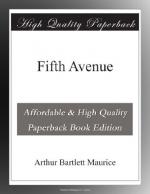The next reception that the chronicler of Fifth Avenue events has seen fit to record was that given to General Grant after the close of the Civil War. At the Fifth Avenue Hotel a number of the city’s leading business men met and planned the public greeting, and one hundred and fifty men subscribed one hundred dollars apiece. The reception to the returning soldier, which took place at the Fifth Avenue Hotel November 20, 1865, was hardly one of which the city or the street had reason to be proud.
Loose management led to disorder and dissatisfaction. Twenty-five hundred jostling, pushing persons crowded the halls, corridors, and reception rooms. The General stood in one of the hotel parlours surrounded by the committee, with Mrs. Grant and other ladies to his right, and on his left Generals Wool, Cook, and Hooker, John Van Buren, Ethan Allen, and others.
Little judgment seems to have been used in issuing the invitations. The throng was indiscriminate. Farce comedy was in the air. Religious fanatics, passing before the hero, offered up prayers for the salvation of his soul. Precocious children were thrust forward to his attention. Preposterous questions were propounded by preposterous people. To add to the confusion the names of those persons who fought their way through the throng to be presented to the General were announced to him by a little man who got most of them wrong.
In a postscript to his “American Notes,” written many years later, Charles Dickens told of the vast changes he found on the occasion of his second visit to the United States—“changes moral, changes physical, changes in the amount of land subdued and peopled, changes in the rise of vast new cities, changes in the growth of older cities almost out of recognition, changes in the graces and amenities of life.” Making all allowances for that greater charity, tolerance, and kindliness of judgment which comes with the riper years—nobody ever could have remained as Britishly bumptious, or as bumptiously British as Dickens was in his younger days when he first came to pay us a visit—taking also into consideration the fact that a certain explanatory softening of earlier criticisms was politic, that the novelist found a city far more to his taste in 1868 than he had found in 1842 is not for a moment to be questioned. Also, at the time he came to New York from Boston, he was naturally in a rather placid and contented mood. For in letters home, even while complaining of the trying changes of the wintry climate, he had told how he was making a clear profit of thirteen hundred English pounds a week, even allowing seven dollars to the pound. When he returned to New York in April, after an extended tour throughout the country, he had still better cause to be pleased with the young Republic. Says Forster in his “Life”:




